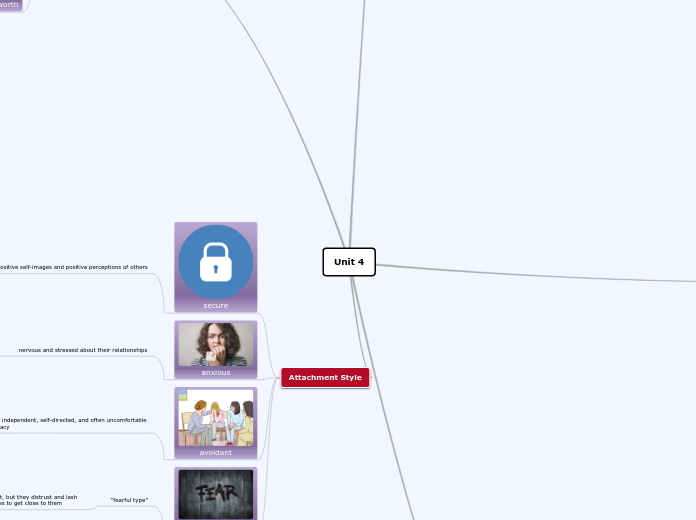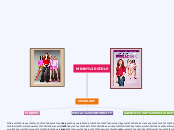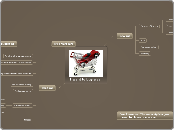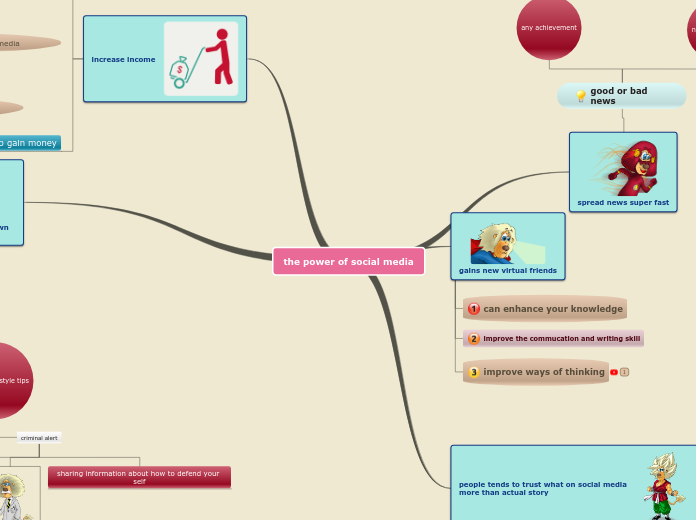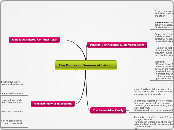emotions that all humans have in common
Unit 4
Attachment Style
anxious-avoidant
“fearful type”
afraid of intimacy and commitment, but they distrust and lash out emotionally at anyone who tries to get close to them
spend much of their time alone and miserable, or in abusive or dysfunctional relationships
a multitude of other emotional problems in other areas of their life (i.e., substance abuse, depression, etc.)
Subtopic
avoidant
extremely independent, self-directed, and often uncomfortable with intimacy
very commited
experts at making their way out of any intimate situation
complain about feeling “crowded” or “suffocated” when people try to get close to them
hey always have an exit strategy
lifestyle constructed to avoid commitment or too much intimate contact
Men are more likely than women to be avoidant types
anxious
nervous and stressed about their relationships
constant reassurance and affection
trouble being alone or single
often give into unhealthy or abusive relationships
trouble trusting people, even if they’re close to them
behaviour can be irrational, random, and overly-emotional
complain that everyone of the opposite sex are cold and heartless
Women are more likely to be anxious types than men
secure
positive self-images and positive perceptions of others
comfortable being alone and independent
correctly prioritize their relationships
draw clear boundaries and stick to them
best romantic partners, family members, and even friends
accepting rejection and moving on despite the pain
loyal and sacrificing when necessary
issue trusting people they’re close to but are trustworthy themselves
50% of the population are secure attachment types
Attachment Theory
Bowlby and Ainsworth
nature infants get by parents contribute to “attachment strategy”
began in the 1950s
influence on attachment to romantic partners
Childs attachment to parents
how well it’s fostered and cared for
Social Development
Socio-emotional selectivity theory
older adults’ social networks
emotional experience as we age
Social contacts limited to a few individuals who are of major
importance to us as we grow older
having less time to waste and they are more
risk-averse
do not want to involve themselves in painful social interactions
OLDER ADULTHOOD 65+ YEARS
older adults have more free time
increase
their involvement with close friends and family rather
than extend their network of social contacts
ADULTHOOD 19–65 YEARS
friendship networks continue to be very
important
marriage and parenthood represent major
social developments in their life
forties and fifties experience time and
family pressures that may limit their social activity
split their time between work, care of
parents, other family commitments and wider social activities
reduction in the amount of social
activity due to these pressures
12–18 YEARS
transition to full independence
from the family
copy the styles of dress, beliefs, cultural values
and behaviours of their own network of friends.
sense of self-worth influenced by other adolescents than by the family.
CHILDHOOD 4–10 YEARS
emotionally attached and dependent on the adults that care
learn social roles and behaviour within their family context
family environment provide a ‘safe base’
co-operate with other children (co-operative play)
increasingly independent
friendships based on a sense of mutual trust
0–3 YEARS
Interacting with caregivers
2 months - start to smile at human faces
3 months - they will respond when adults talk
5 months - infants can distinguish between familiar and
unfamiliar people
Infants make their first relationships as they form an emotional attachment to carers
infants will play alongside other
children (parallel play)
Birth Order
only child
often reaping great rewards professionally
characteristics may interfere with personal happiness in life
focus on the details and have a hard time relaxing
seek approval
center of attention
only child holds roles similar to the eldest child
youngest born
Confident
Conscientious
Responsible
Perfectionist
Center of attention
Seek approval
Sensitive
Mature for their age
Leader
outgoing
older figures to learn fro
older siblings helps excel your social skills
inherit what they believe is “funny and cool” boosting your social skills
self centered
always the most selfish
feel they deserve everything
catered and babied throughout their lives
everything handed to as a kid from my siblings and parents
uncomplicated
have elder siblings to learn from
parents more lenient and nice towards the young one because they do not commit as many mistakes as their older siblings
role of the baby of the family no matter the age
middle born
sometimes are rebellious
Adaptable
Independant
People pleaser
Social
Rebellious
Feels left out
Peacemaker
feel they do not get enough attention
creative in their ways to earn attention
earn their place within the family and seek recognition
do not have a drive towards perfectionism
first born
leader to the rest of the pack
perfectionist, archivers, and reliable people
pressure to be perfect
achieve goals and rewards for great work ethic
Perfectionist
Achiever
Leader
Bossy
Responsible
Motivated
Conscientious
Controlling
Cautious
Reliable
Atlas of Emotions
enjoyment
feeling connection and/or sensory pleasure
peace and ecstasy
intense ecstasy
feel mild or strong peacefulness
fear
feeling a threat of harm
anxiety and terror
intense terror
mild or strong anxiety
disgust
feeling that something is toxic
dislike and loathing
intense loathing
mild or strong dislike
anger
feeling of being blocked in our progress
annoyance and fury
intense fury
feel mild or strong annoyance
treated unfairly
sadness
disappointment and despair
intense despair
mild or strong disappointment
sense of loss
